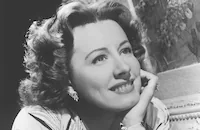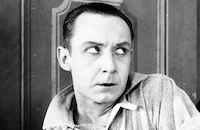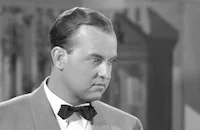Joy of Living

Brief Synopsis
Cast & Crew
Tay Garnett
Irene Dunne
Douglas Fairbanks
Alice Brady
Guy Kibbee
Jean Dixon
Film Details
Technical Specs

Synopsis
On opening night of her new show, Broadway musical star Maggie Garret is rescued from a horde of autograph seekers by wealthy Boston shipowner Dan Brewster, who adores her "angelic" performances but loathes her parasitic family. Unappreciative of Dan's efforts, Maggie has him arrested for mashing but, in court, reluctantly agrees to serve as his probation officer. Although she is strongly attracted to Dan, his accurate but stinging appraisals of her family, whose spending habits force her into a killing work schedule and near bankruptcy, infuriates her. Determined to win her heart, however, Dan convinces her to spend a "cheap" evening with him at various night spots, including a German beer hall and a skating rink. Drunk and happy, Dan and Maggie return to the Garret home, where Dan's presence causes the family to protest in panic. After Dan accuses Maggie's parents, sister Salina and brother-in-law Bert of being leeches, the ever loyal Maggie throws him out. When she learns that he is about to set sail, however, Maggie catches him at the dock and proposes. Once married, the couple realize that they have different ideas on how to spend their lives together, and Dan, who wants Maggie to leave her family and career, demands an annulment. Despondent, Maggie returns to her family but, after being subjected to their excessive whining about her sudden marriage, finally sees the depth of their selfish dependency. Chasing after Dan in the rain, Maggie gleefully announces that she is ready to sail with him to his South Sea island, "Paradise."

Director

Tay Garnett
Cast

Irene Dunne

Douglas Fairbanks

Alice Brady

Guy Kibbee

Jean Dixon

Eric Blore

Lucille Ball

Warren Hymer

Billy Gilbert
Frank Milan
Dorothy Steiner
Estelle Steiner
Phyllis Kennedy

Franklin Pangborn

James Burke

John Qualen
Spencer Charters

Grady Sutton

Charles Lane
Frank M. Thomas
Franklin Parker
George Chandler
Pat Flaherty
Crew
Graham Baker
Russell Bennett
Carroll Clark
Seymour Felix
Dorothy Fields
Dorothy Fields
Herbert Fields
Tay Garnett
Jack Hively
Kenneth Holmes
Kalloch
Jerome Kern
Elizabeth Mcgaffey
Van Nest Polglase
Allan Scott
Darrell Silvera
Edward Stevenson
Frank Tours
Gene Towne
John E. Tribby
Joseph Walker
Vernon L. Walker
Felix Young

Film Details
Technical Specs

Articles
Joy of Living
Director Tay Garnett, best known for The Postman Always Rings Twice (1946), ran into an unexpected problem getting Joy of Living off the ground-starting with the title. In compliance with the Hays Code, basically the precursor to the current film ratings system, Garnett submitted the script for approval with its original title, Joy of Loving. The response? "Those watchdogs in behalf of public morals explained icily that, to avoid corrupting the young, there must be no exploitation of the joy of loving. Loving was conjugal duty, involving a possible nod from the stork. All strictly business, and job be damned. Our title was mandatorily changed to Joy of Living, which is a gas if one accepts that Hays office premise that one may experience the Joy of Living, only if one avoids the joy of loving."
In a 1978 interview with Dunne, she revealed that not only did she never see a finished version of the film, she further mused, "I don't remember anything about that picture . . . I remember that Douglas Fairbanks-funny the things you do remember-that Douglas had been in England and was quite an Anglophile. There was a scene where he wanted to say "fu-tile"-and Tay Garnett said, this is an American picture, and you are going to saw "fewtle" if we have to stay here all day. And we nearly did."
For his part, Fairbanks, Jr., was effusive about his costar: in Romantic Comedy by James Harvey, he declared her "A craftswoman," saying, "'nothing is instinctive' or 'left to chance,' but 'instead of being dull and perfect,' she's 'enchanting and perfect.'" As an up-and-comer, Lucille Ball remembered watching the stars and comparing their styles; "Hepburn 'telegraphed,' she said-'Well, I'm going to be funny'-whereas Dunne always surprised, even in repeated takes of the same scene. 'But I watched her do takes-literally, one day there were thirty-two takes-and twenty-five must have been different. She really worked on how to do that scene. Where Kate would do it the same way every time and telegraph it every time.'"
All those takes, however, must have added up: Garnett's production budget quickly ballooned out of control, topping out at over a million dollars, an astronomical sum for films at that time. Despite the priceless talent, Joy of Living didn't have a chance at recouping its costs and was a financial failure for the studio. Nevertheless, it holds up as one of the more entertaining screwball comedies of its era.
Producer: Tay Garnett, Felix Young
Director: Tay Garnett
Screenplay: Gene Towne, C. Graham Baker, Allan Scott, Dorothy Fields, Herbert Fields
Cinematography: Joseph Walker
Film Editing: Jack Hively
Art Direction: Van Nest Polglase
Music: Jerome Kern
Cast: Irene Dunne (Maggie Garret), Douglas Fairbanks, Jr. (Daniel Brewster), Alice Brady (Minerva Garret), Guy Kibbee (Dennis Garret), Jean Dixon (Harrison), Eric Blore (Potter).
BW-91m.
by Eleanor Quin

Joy of Living
Quotes
Trivia
Notes
The working title of this film was Joy of Loving. According to an October 1937 Hollywood Reporter news item, John Barrymore was "set" for the lead in the production.














